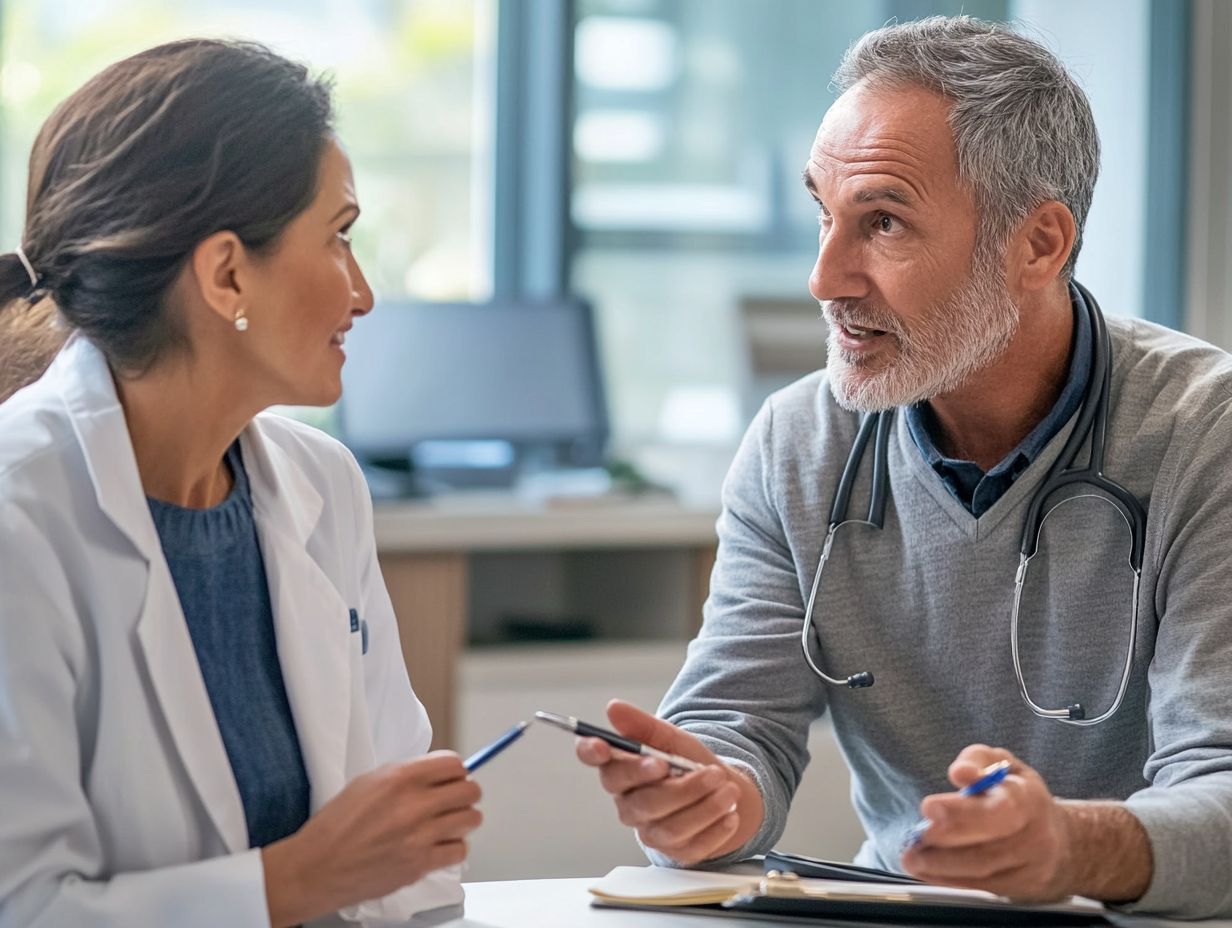Navigating a cancer diagnosis can be overwhelming, but asking the right questions can empower patients and guide their treatment journey. Involving your medical oncologist and the cancer care team is crucial for comprehensive support. Here are five essential questions to discuss with your oncologist:
- What Type of Cancer Do I Have? – Understanding your specific cancer type, such as lung cancer, leukemia, or lymphoma, is crucial for determining the appropriate course of treatment. Diagnostic tools like imaging scans, blood tests, and biopsies help classify the cancer.
- What Stage Is My Cancer? – Staging cancer assesses the extent of cancer metastasis and is vital for planning treatment. Tests such as CT and PET scans provide detailed information on cancer size and spread.
- What Are My Treatment Options? – Explore treatments such as chemotherapy infusions, surgery, and immunotherapy, and consider the possibility of participating in clinical trials for access to new therapies and patient empowerment.
- What Are the Potential Side Effects of Treatment? – Be informed about the physical and emotional side effects, including potential emotional distress of treatments to better prepare and manage your quality of life and treatment management.
- What Is the Prognosis for My Cancer? – Discuss the expected outcomes, including potential cancer recurrence and treatment effectiveness, and survival rates based on your cancer type and stage to make well-informed treatment decisions.
These conversations can provide clarity and aid in making informed choices about your cancer care. Additionally, consider asking about symptom management, available support services, and the involvement of healthcare professionals to navigate your treatment with confidence.
Key Takeaways:
1. What Type of Cancer Do I Have?

Determining the type of cancer you have involves medical evaluation, including tests, physical exams, and consultations, to identify the specific cancer type, such as lung cancer, leukemia, or lymphoma.
Doctors use diagnostic tools like imaging scans, blood tests, and biopsies, integral to healthcare communication, to classify the cancer type for appropriate treatment planning.
2. What Stage Is My Cancer?
Cancer staging determines the extent of cancer in the body, including cancer metastasis, and informs treatment decisions.
Staging involves diagnostic tests like CT scans, MRI, PET scans, and biopsies to assess cancer size, location, and spread.
Healthcare professionals interpret test results to identify cancer stage, providing clarity on treatment options, treatment duration, and outcomes.
3. What Are My Treatment Options?
Cancer treatment options include various treatment regimens:
- Chemotherapy infusions
- Immunotherapy
- Targeted therapy
- Surgery, often performed by a surgical oncologist
- Radiation therapy
Oncologists and specialized doctors, including oncology nurses and patient access staff, coordinate treatments based on cancer type and patient needs.
Participation in clinical trials offers access to experimental therapies and can be facilitated by case managers and patient education.
4. What Are the Potential Side Effects of Treatment?
The potential side effects of cancer treatment include physical symptoms like nausea, fatigue, and hair loss, along with emotional challenges such as anxiety and depression, which contribute to emotional distress.
Cancer treatment may cause a range of physical and emotional side effects that affect quality of life and require careful treatment management.
5. What Is the Prognosis for My Cancer?

The prognosis for your cancer depends on the type of cancer, its stage, and available treatments.
Cancer prognosis includes the likelihood of treatment success, chances of recurrence, and expected survival rates.
Consulting with healthcare providers helps patients understand their specific prognosis and make informed treatment decisions.
How Can I Manage My Symptoms and Side Effects?
To manage cancer treatment symptoms and side effects, engage in occupational therapy to regain daily activity skills, adopt a health-focused diet, and seek emotional support from therapy or support groups.
Collaborate with healthcare professionals for tailored advice and resources to ensure comprehensive care.
What Support Services Are Available to Me?
Support services available include professional counseling, patient education, and community support groups.
Professional counseling provides emotional support for those facing cancer.
Patient education offers information about treatment options and healthcare logistics.
Community support groups offer shared experiences and practical advice.
These resources help individuals manage their cancer journey more effectively.
What Lifestyle Changes Can Help Improve My Outcome?
Lifestyle changes improving cancer outcomes include maintaining a balanced diet, engaging in physical activity, and ensuring emotional support to enhance health management.
A balanced diet consists of fruits, vegetables, whole grains, and lean proteins to support the immune system and may involve dietary changes.
Physical activities like walking or yoga can improve energy levels, mood, and contribute to the recovery process.
Emotional support from family, friends, or support groups is crucial for mental well-being and managing emotional distress.
What Are the Risks and Benefits of Each Treatment Option?

Understanding the risks and benefits of each cancer treatment option, including potential impacts on health insurance, is essential for knowledge-based decision making.
- Each treatment option, such as surgery, chemotherapy infusions, immunotherapy, or targeted therapy, has unique risks and benefits. Engaging with cancer specialists can provide greater insight into these options.
- Surgery, often performed by a surgical oncologist, can remove tumors but carries risks like infection and is crucial in treating certain cancer types.
- Chemotherapy infusions can reduce tumors but may cause side effects like fatigue and nausea, impacting treatment duration and quality of life.
- Immunotherapy boosts the immune system but can lead to autoimmune reactions.
- Targeted therapy attacks cancer cells specifically but may cause less severe side effects.
Discussing these options with healthcare professionals, including case managers, helps patients evaluate how each treatment aligns with their health conditions and lifestyle, supporting patient empowerment and informed decision-making.
What Are the Success Rates of the Recommended Treatment?
Success rates of recommended cancer treatments vary by cancer type, stage, and are influenced by ongoing cancer research.
Targeted therapies and immunotherapies, evaluated in clinical trials, can have success rates over 70% in early-stage cancers.
Late-stage cancer treatments may have lower success rates, often around 30%.
Success rates depend on clinical trial data and ongoing research.
How Can I Get a Second Opinion?
To get a second opinion, contact another specialist, such as those at Texas Medical Center, in your health condition to review your diagnosis and treatment plan, ensuring confidence in your cancer journey.
Gather all medical records, test results, and imaging studies to present to the new doctor.
- A second opinion helps confirm your current treatment path, consider patient support options, or explore alternative options, especially in cases of rare or aggressive conditions.
Frequently Asked Questions
What are the 5 essential questions to ask your oncologist?

The 5 essential questions to ask your oncologist are:
- What type of cancer do I have and what is its stage?
- What are my treatment options and which one do you recommend?
- What are the potential side effects of the treatment?
- What is the expected outcome of the treatment?
- What lifestyle changes should I make to support my treatment?
Why is it important to ask these questions to your oncologist?
Asking these questions to your oncologist will help you better understand your cancer diagnosis, treatment options, and potential outcomes. It will also help you make informed decisions about your health and treatment plan with the assistance of your cancer care team.
What information should I provide to my oncologist when asking these questions?
You should provide your oncologist with any medical records, test results, including lab tests and imaging studies, and any symptoms or concerns you have. It is important to be open and honest with your oncologist, ensuring effective healthcare communication, to ensure the best possible care.
How can I prepare for my appointment with my oncologist?
To prepare for your appointment, make a list of your questions and concerns regarding your cancer journey. Bring a friend or family member for support and to take notes. Also, make sure to have your medical records and test results, including any outpatient treatment details, with you.
What should I do if I don’t understand my oncologist’s answers?
If you don’t understand your oncologist’s answers, don’t be afraid to ask for clarification or to repeat the information. You can also ask for written materials or resources to help you better understand your diagnosis and treatment plan.
Is it okay to get a second opinion from another oncologist?
Yes, it is always okay to seek a second opinion from another oncologist. It is important to feel comfortable with your treatment plan and to explore all your options, including those at institutions like MD Anderson Cancer Center. Your oncologist should support and encourage you to seek a second opinion if you wish to do so.





